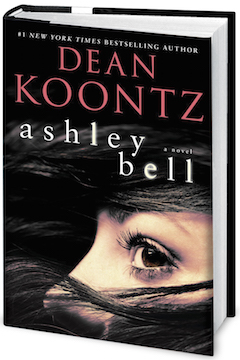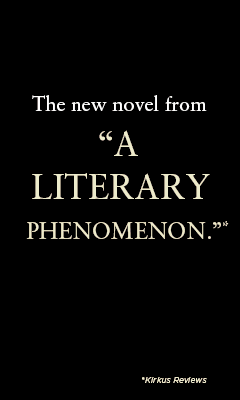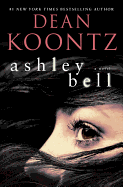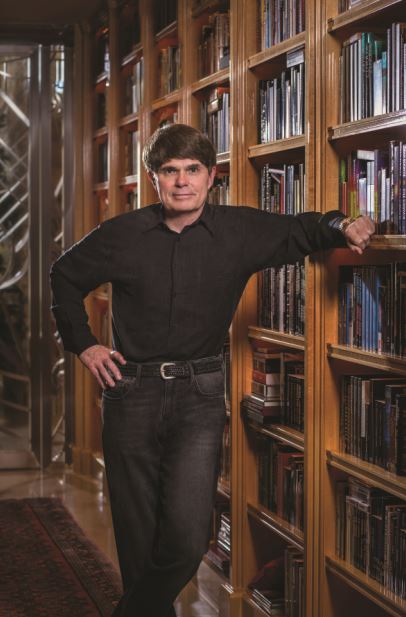Ashley Bell
by Dean Koontz
Despite her somewhat frivolous-sounding name--or perhaps because of it--Bibi Blair, the 22-year-old protagonist of Ashley Bell, is determined to make it clear that she is fierce and dauntless. Engaged to a Navy SEAL currently on an unspecified mission in an unspecified country, she's learned a thing or two about what it means to be strong. And as an author, she understands the power of imagination in shaping a story--even when that story might be her own. These are traits that serve her well when she is diagnosed with a rare form of brain cancer and told she has less than a year to live.
At first, her response to this statement--"Really just one year? We'll see."--appears to be little more than wishful thinking in the face of a horrible prognosis. But it quickly becomes clear that, unlike her laid-back parents--both California surfers--Bibi does not subscribe to the "it will be what it will be" way of life. "She loved her parents, but she was not them. Fate did not rule her. She was master of her fate, the captain of her soul. She would not quit. SURRENDER was not a word that could be made from the lettered tiles of her name."
This desire to be master of her fate is central to both the character of Bibi and the story of Ashley Bell. To the delight of her parents (and shock of her doctors), Bibi quickly overcomes her cancer: she wakes from a deep sleep miraculously and mysteriously cured. But she does not want to live without understanding the why and how of it. Her persistence and search for enlightenment sets Koontz's novel on a fascinating exploration of destiny that is heart-pounding and mind-boggling.
After her release from the hospital, Bibi meets with a masseuse-turned-mystic engaged by her parents, who convinces her that her life was spared in order to allow her to save the life of another--Ashley Bell. With no idea who Ashley Bell is, what (or whom) she needs saving from, or where she might be, Bibi is left confused but more determined than ever to find answers. Her sense of dread and puzzlement grows as her search leads her into darker and darker territories, uncovering sinister plots of neo-Nazis and human sacrifice that raise the stakes in finding Ashley.
Those stakes become higher and the story stranger as eerie childhood memories start to creep into Bibi's mind, unbidden and unwelcome: half-remembered conversations with her long-deceased friend Captain; the arrival of a dog, Olaf, who wandered into her life out of a rainstorm just when she needed a companion; nightmares of waking up with a monster in her room ("The wrapped figure sits in a corner chair, for the moment still. Then it squirms in the confining shroud--and speaks.")
These memories, coupled with an exhausting, persistent feeling of being followed, watched and taunted by those holding Ashley Bell, set Bibi to questioning what is real and what is imagination. After one of her more inexplicable experiences with what might be supernatural or might be just in her head, she realizes that "madness and sanity were two worlds separated from each other by no more than a single step." Did she actually wake with a monster in her bedroom or merely dream it? Did she hear someone knocking at her window or did she imagine it? Are her run-ins with a professor from her college days mere coincidence or proof of some unseen forces at work?
"Bibi sensed that there was something she knew that she didn't know she knew, an elusive understanding that, if she could arrive at it, would make sense of everything." Which is much the way readers will feel throughout this lengthy novel, knowing that there must be some key to understanding the mystery surrounding Bibi and Ashley, but not grasping until the end what that key might be--or how it shapes Bibi's story.
Koontz (Innocence) is a masterful plotter, capable of juggling the many threads of this story without losing sight of the whole. There are many strands: neo-Nazism, details of Bibi's past, a wobbling sense of reality, the story of her SEAL fiance's mission. But Koontz knows how to captivate and surprise; readers will be handsomely rewarded by this well-paced thriller that blurs the line between what is real and what is imagined, between past and present, present and future. Ashley Bell is a rarity of a thriller--one that asks big questions about life and destiny while succeeding in creating such an eerie sense of reality that sleeping with the lights on might seem like a sane idea. --Kerry McHugh








